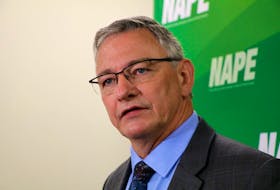The federal government has announced a prominent former civil servant as its lead representative in negotiations on rate mitigation as talks on restructuring of finances associated with the Muskrat Falls power project and related issues enter what Prime Minister Justin Trudeau calls the “next phase.”
That phase begins with the federal government waiving — temporarily — the province’s immediate financial obligations with regards to debt attached to the Lower Churchill project.
Serge DuPont, former deputy clerk of the Privy Council, will head up the federal team in the negotiations. During his 35 years in the public service, Dupont was also Deputy Minister of Intergovernmental Affairs as well as an Associate Deputy Minister of Natural Resources, and was touted by The Hill Times as one the 99 most influential figures to watch in federal politics last year.
In 2018, he joined the law firm of Bennett Jones as a senior advisor for intergovernmental affairs.
It has already been announced the province’s lead in the talks will be Brendan Paddick, on a leave of absence as chairman of Nalcor.
Premier Andrew Furey, who joined Trudeau in a virtual announcement, called the entrance into negotiations “a bold first step … to help us right the direction of Muskrat Falls, the Lower Churchill, the Atlantic Loop and the financial uncertainty that has been like an anchor on all of us.”
The first phase of talks resulted in short-term debt relief of $844 million — money that was to required for servicing the province’s debt associated with the Lower Churchill, funds that would have to have been borrowed, adding to what is already a huge provincial deficit.
Almost all of that money was due to have been paid by the end of 2020.
Most of that money would have been needed to have been paid by the end of 2020.









